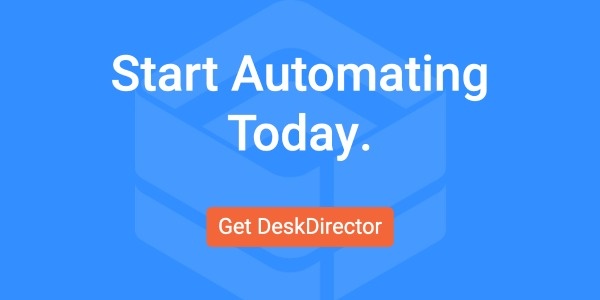IT automation isn’t just for the IT department. Automated workflows can be used across every team, including human resources. With so many irons in the fire, HR teams rely on efficiency, speed, and repeatable processes to support employees on a daily basis.
ITSM software includes automation capabilities to help HR drive productivity and reach their most important goals. Workflow automation is a great way to save time, standardize processes, improve the employee experience, and deliver value to the business.
Read on to understand the ins and outs of an HR ticketing system and how it can improve every element of HR, from onboarding to payroll.
What is a Ticketing Software for HR (And Why do you need one)?
HR Ticketing System Definition
An HR ticketing system is a software solution designed to manage and streamline the process of handling employee inquiries, requests, and issues within an organization. This system acts as a centralized platform where employees can submit their concerns, which are then categorized, assigned, tracked, and resolved by the HR team.
The main goal of an HR ticketing system is to improve the efficiency and effectiveness of the HR department, ensuring that employee needs are met promptly and systematically.
Essential Features of a Ticketing System for HR
The best HR ticketing systems have the following features:
- Centralized Dashboard: Provides a unified interface for managing all incoming tickets, making it easier to oversee and prioritize tasks.
- Automated Ticket Assignment: Automatically assigns tickets to the appropriate HR personnel based on predefined rules, ensuring that requests are handled by the right people.
- Tracking and Reporting: Allows HR teams to track the status of each ticket and generate reports on various metrics, such as response times and resolution rates.
- Knowledge Base Integration: Integrates with a knowledge base that offers self-service options, enabling employees to find answers to common questions without submitting a ticket.
- Communication Tools: Facilitates communication between HR and employees through integrated messaging systems, ensuring clear and efficient exchanges.
- Escalation Management: Provides mechanisms for escalating unresolved or high-priority issues to higher levels of management.
- Customizable Workflows: Allows customization of workflows to align with the specific processes and policies of the organization.
Benefits of an HR Ticketing System
Once you choose an HR ticketing system with all the must-have features, your HR department and organization at large will reap the benefits:
- Increased Efficiency: By automating and streamlining the handling of HR inquiries, the system reduces the time and effort required to manage employee issues, freeing up HR personnel for more strategic tasks.
- Improved Employee Experience: A structured and responsive system ensures that employee requests are addressed quickly and effectively, leading to higher satisfaction and engagement.
- Enhanced Transparency and Accountability: The ability to track tickets and monitor their progress promotes transparency within the HR department, making it easier to hold individuals accountable for their tasks.
- Better Data Management: Centralizing all HR requests and communications in one platform improves data organization, making it easier to retrieve and analyze information when needed.
- Scalability: As organizations grow, the volume of HR requests increases. An HR ticketing system can scale with the business, handling a larger number of tickets without compromising on efficiency.
- Insightful Analytics: The reporting features of an HR ticketing system provide valuable insights into trends and patterns in employee requests, helping HR to identify and address recurring issues proactively.
- Compliance and Record Keeping: The system ensures that all interactions and resolutions are documented, which is crucial for maintaining compliance with labor laws and regulations.
Implementing an HR ticketing system can revolutionize the way your HR department operates, transforming it into a more responsive, efficient, and data-driven entity. Whether your organization is small or large, this tool can significantly enhance the management of recruitment, onboarding, payroll and more to contribute to a more productive workplace.
Talent Search & Recruitment
HR must balance hiring quickly while also finding a high-quality candidate to fit the role. Automated workflows within ITSM software can be used for every stage of the recruitment process to help achieve this critical balance of speed and quality.
IT automation makes it possible to accelerate the initial hiring search. First, HR managers can build workflows for job postings, application tracking, and selecting promising candidates from the general pool. Then, managers can build workflows for the interview process to make it easier, and ultimately, they can create automations to support the final selection and offer process.
ITSM software will typically include SOP management features as well. This can be helpful for the human resources department because it empowers HR managers to create and store SOPs in the app and attach them to workflow tickets. SOPs provide guidance for the entire HR team, so everyone knows what steps need to be taken for recruitment, from the application to the interview to the written offer.
The best IT automation solutions don’t limit the number of SOPs that can be created, so HR can write role-specific procedures for recruitment. Process specificity is essential because every role will require a different approach to confirm whether someone is a good hire.
For example, a software engineer’s interview process will probably include a coding challenge to assess their skill set. But that wouldn’t apply to a customer service rep candidate or a marketing manager hopeful.
TLDR: IT automation allows you to set up workflows with specific standard procedure documentation to save time and complete recruitment tasks faster.
Onboarding
The importance of employee onboarding cannot be overstated. A strong onboarding program can increase employee retention by 82% and boost productivity by 70%. Therefore, HR leadership must devote thought and effort to creating an effective onboarding plan for new hires.
Firstly, the HR team must ensure that all the new hire paperwork is completed and collected for employee records. Then, it’s time to complete the necessary legal and compliance training and bring the new hire up to speed on company policies.
Beyond this, most jobs require specific OTJ (on-the-job) training. HR must facilitate the instruction via the new hire’s manager or qualified co-worker. And finally, employees often need network access, keys or a code to enter the office building, computer, and other equipment to get set up. HR and IT need to work together to get all of this done.
IT automation strengthens the entire onboarding process from end to end because HR managers can set up specific workflows and SOPs to guide every touchpoint. In addition, automating onboarding procedures means that every new employee undergoes a standardized, well-paced experience that provides the same quality across the board.
TLDR: Deploying workflow automation with standardized training instructions will improve new hire onboarding. Excellent onboarding delivers significant value to the business in the long run because it enhances the employee experience and reduces churn.
Payroll, Scheduling, and PTO
Automating payroll tasks within an ITSM software solution can increase efficiency and reduce the possibility of errors. For example, suppose your organization operates on a shift-scheduling basis or supports hourly employees. In that case, HR must ensure that they schedule shifts properly, manage timecards correctly, and track overtime hours.
Admins can build IT automation workflows for regular scheduling tasks. Managers can delegate scheduling tasks to subordinates with automated approvals built into the workflows to get final sign-off from management.
Automated workflows can also be set up for regular process transactions for payroll disbursement, any salary or benefit changes, and reconciling the pay with the company’s overall budget.
Finally, HR can use ITSM software to manage leave and PTO. Employees can submit time-off requests via the user portal, triggering a PTO-specific workflow. HR can calculate the remaining PTO, sick days, maternity or paternity leave, or bereavement and sign off on the request.
TLDR: HR teams can automate regular scheduling and payroll tasks through workflows and automatic approval chains. Employees can also send requests to HR for time off through a user portal for approval.
Workplace Incidents and Disciplinary Action
Unfortunately, the human resources team must address issues that arise in the workplace. Each workplace incident must be handled with the utmost care and discretion.
IT automation workflows can help accelerate and regulate the HR response to workplace conflicts, harassment reports, disciplinary action cases, injuries, accidents, or non-compliance in the workplace.
Pre-built, custom workflows and SOPs will give instructions to ensure all proper steps are taken to resolve every case. Plus, some ITSM software includes ticket groups, which can only be accessed by specific employees only. Admins can determine privacy settings on ticket groups for HR incidents to protect employee and company privacy.
TLDR: IT automation workflows can regulate workplace incident case resolution, and ticket groups protect confidentiality.
Leverage IT Automation to Streamline HR Operations
ITSM software provides human resources teams with the automation tools to power better processes. More effective HR drives optimal business results. To experience the power of automated workflows, try DeskDirector for free.









